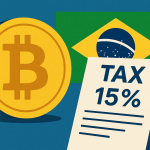The crypto world is once again bracing for impact. A surprise amendment to the CLARITY Act, scheduled for review in the House Financial Services Committee, has reignited concerns about heavy-handed regulatory oversight—this time through a clause that many are calling the “Gensler-era revival.”
Originally pitched as a path to regulatory clarity for digital assets, the CLARITY Act was supposed to reduce confusion by setting clear rules for whether a crypto token is a security or a commodity. But the latest amendment throws a wrench into that plan. It removes exemptions for tokens issued in the past and grants the Securities and Exchange Commission (SEC) new powers to reassess and reclassify them on a case-by-case basis.
In short: tokens that were previously considered “safe” could now be pulled back into regulatory limbo.
For many in the crypto space, this feels like déjà vu. The SEC’s aggressive enforcement under former chair Gary Gensler was marked by lawsuits, inconsistent classifications, and a general lack of clear guidelines. That chapter was supposed to be over. Instead, this amendment signals a possible return to that same enforcement-first mentality—something the industry hoped the CLARITY Act would leave behind.
Critics of the amendment argue it undermines the bill’s purpose. Without hard definitions or technical standards for what qualifies as a security, token projects could again be subject to arbitrary judgment. The industry has long pushed for bright-line rules—such as measuring decentralization or token utility—to replace vague legal tests and courtroom battles.
On the flip side, supporters of the bill say the broader package still holds value. Other proposed protections include shielding non-custodial developers and DeFi infrastructure from being treated as money transmitters, which many view as a necessary safeguard for innovation. But even those positives are being overshadowed by concerns about renewed SEC overreach.
As the hearing begins, the key question looms: will the bill offer real clarity, or just a different shade of confusion?
One thing’s clear—if Congress doesn’t draw the lines, the SEC will. And the industry may once again be stuck playing defense.





